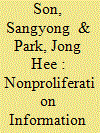| Srl | Item |
| 1 |
ID:
193104


|
|
|
|
|
| Summary/Abstract |
What explains the foreign policy gap between elites and the general public on nuclear proliferation? We investigate specific contexts in which experts’ nonproliferation information changes public attitudes toward nuclear weapons development using a novel attitude change experiment. By randomly assigning seven categories of nonproliferation information to pro-armament survey participants, we examine how different types of nonproliferation information affect pro-armament respondents’ opinions and behavioral choices. The results of our experiment demonstrate the enlightening effect of economic sanctions information. After learning about the economic costs and consequences of nuclear weapons development, pro-armament respondents substantially changed their opinion as well as behaviors toward nuclear proliferation. In comparison to economic sanctions information, other types of nonproliferation information (e.g. conditional military punishment, normative sanctions, nuclear technology sanctions, elite or public opposition to proliferation) have limited effects on pro-armament subjects’ attitude changes. These findings are the first to identify the relative explanatory powers of previous explanations for nuclear nonproliferation at the individual level.
|
|
|
|
|
|
|
|
|
|
|
|
|
|
|
|
| 2 |
ID:
117530


|
|
|
|
|
| Publication |
2012.
|
| Summary/Abstract |
As countries increasingly protect their domestic industries by government subsidies, specific subsidies-subsidies that target specific industries or firms-have received increasing international attention due to their negative externality in international trade. In this paper, I argue that variations in domestic institutional arrangements can explain the cross-national variation in subsidy specificity. First, I theorize that the size of specific subsidies has an inverted U-shaped relationship with the level of centralization of economic interests, while the size of general subsidies monotonically increases with the level of centralization of economic interests. Then, I expect the supply-side factors such as electoral institutions and government partisanship to interact with the effects of centralization in determining the amount of specific or general subsidies in a country. Using the state aid data set of the European Union between 1992 and 2004, I find that the amount of sectoral aid-state aid targeted at specific industries or firms-is larger in countries where labor and business interests are organized at the industry level than in countries with decentralized or highly centralized industrial relations. The size of state aid targeting a wide range of economic sectors increases as the centralization of labor and business interests increases.
|
|
|
|
|
|
|
|
|
|
|
|
|
|
|
|